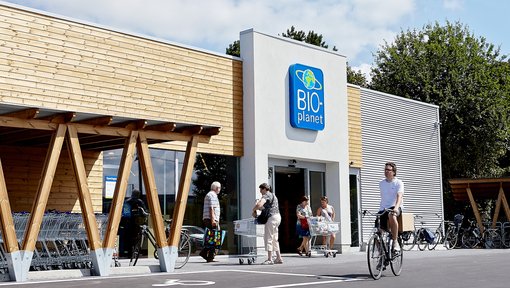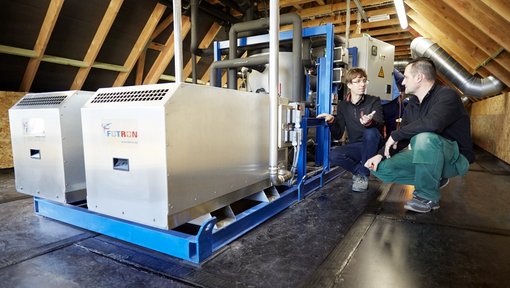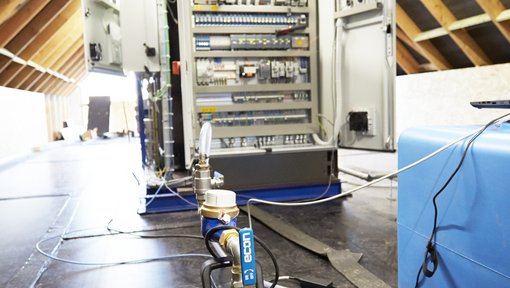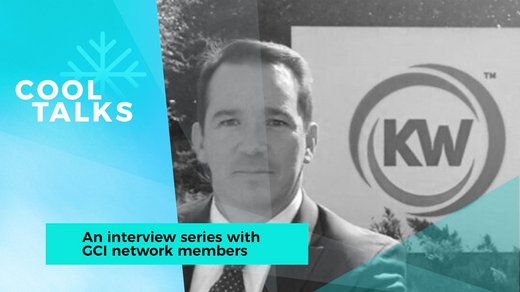Project engineer Collin Bootsveld works hard every day to make sure that by 2030 all Colruyt supermarkets are equipped with climate-friendly refrigeration systems. We spoke to him about his ambitions and his vision of an HFC-free future.
Collin, you’ve got an academic background as a chemical engineer. How long have you been applying your expertise in the field of climate-friendly cooling – and since when at Colruyt Group?
I have worked on energy related subjects since my first job, in 1992. I advised on the improvement of industrial processes, including for instance the use of cooling in a cheese factory. From 1999, climate-friendly comfort cooling was my focus at the department of refrigeration and heat pump technology, of research institute TNO in the Netherlands. I worked on adiabatic cooling but also on the integration of heat pumps in buildings and green houses and on moisture control in historic buildings. At Colruyt Group, my first projects in 2010-2013 were concerned with sustainable mobility: a hybrid truck, the use of CNG in trucks and, the introduction of hydrogen technology. In hindsight, this experience proved to be a good basis for the introduction of flammable refrigerants, since all the previous technologies were flammable as well and I know what steps to take.
Personal motivation
This video is being blocked because of your cookie settings.
Colruyt Group is now one of the main players, building a network of public hydrogen filling stations, and investing in the use of hydrogen to store sustainable electricity. These filling stations use propane and or CO2 as refrigerants for the cooling of hydrogen to -40°C. Since 2013, I develop concepts for climate-friendly retail cooling. The solutions for retail cooling are there. The conversion of existing installations will still take ten years, but the steps are clear. For comfort cooling, I hope to make the switch to split AC with propane as the refrigerant as well.
What set you on this path and why do you personally care about the environment?
When I came from university, there were few jobs in my own field of chemical engineering, and I ended up in an energy-consulting job. Personally, I have since childhood been interested in nature and I cannot imagine doing anything else then working on technologies that are better for the environment.
Gallery
His most rewarding and frustrating experience
At Colruyt Group, you are leading a programme to replace the existing heating and cooling systems in supermarkets based on fossil fuels and chemical refrigerants with heat pump systems based on natural refrigerants. What was your most rewarding experience in this regard?
My most rewarding experience was to see how co-workers have embraced the new solutions, how they have become advocates themselves. They now complain if the insulation of an existing building is not good enough for heat pumps to be feasible.
What was your most frustrating experience in this regard?
A significant part of the world players in refrigeration, comfort cooling and heat pumps, prefer to continue with the existing model of selling equipment with HFCs. They make their own profit to the detriment of society.
Infobox Colruyt Group
The Colruyt Group is one of the largest retailers in Belgium, with around 29,000 employees and over 500 shops. Since 2014, the supermarket chain has been using 100% natural refrigerants in all its new refrigeration systems. This means that in Belgium, the company will emit 11 % less CO2 compared to its total CO2 emissions in 2015.
Read more on Colruyts cooling strategy… (opens in a new window)
Ideal RAC sector
What would an ideal refrigeration and air conditioning industry look like in the future?
Ideally, worldwide boundaries would be in place that push the industry to use sustainable cooling as their first choice. The Kigali Amendment to the Montreal Protocol should be much more ambitious.
Please complete...
The biggest obstacle for Green Cooling at the moment is...
"The lobbying power from HFC producing companies and their ability to spread confusion, like saying that we need to look at the TEWI (Total Equivalent Warming Impact) thus suggesting that there is a trade-off between the refrigerant GWP and the overall climate impact of a cooling installation. The truth is that the natural refrigerants have the lowest GWP AND the best energy efficiency."
There should be more women in refrigeration and air conditioning because…
"Well, I asked them what I could write and they found it strange to make the distinction. They are professionals in their job and pleasant co-workers, just like their male co-workers are."
I love my job because...
"I can be involved in the details of sustainable cooling and feed this into the global perspective."





